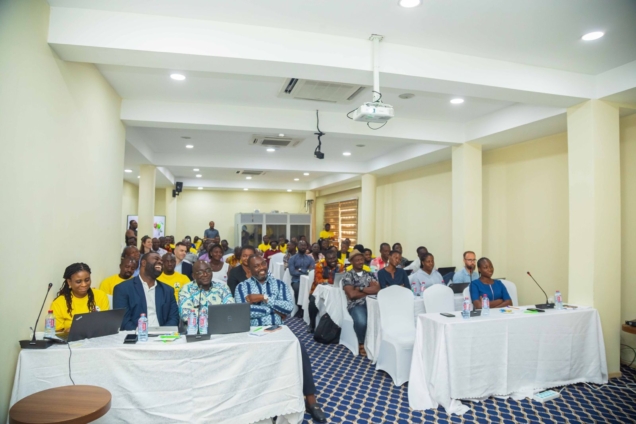Cocoa industry regulator, Ghana Cocoa Board says it is set to introduce aggressive measures aimed at addressing the unfortunate phenomenon whereby some cocoa farmers lease their farms for purposes other than cocoa production.
The Head of Public Affairs at COCOBOD, Fiifi Boahen, who gave the hint when addressing participants at the Annual General Meeting of the Ghana CSOs Cocoa Platform (GCCP) in Accra said the Board was deeply worried about the wanton destruction of viable cocoa farms, including newly rehabilitated ones, and would soon roll-out measures to protect cocoa farms and safeguard the industry.

The move comes amidst concerns about reports that some farmers are continuously leasing their lands for mining and other activities, denying the country the much-needed revenue from her major agricultural export commodity.
However, according to Mr. Fiifi Boafo, the Board would soon announce comprehensive measures, including signing a Memorandum of Understanding with cocoa farmers to dissuade them from giving their farms out.
He observed that government, through COCOBOD, has invested huge spent millions of dollars out of a loan facility from the African Development Bank (AfDB) to revive thousands of hectares of moribund and cannot therefore sit unconcerned and allow unscrupulous elements to wash.

“There are moves to come to some understanding with farmers on how best to preserve their cocoa farms and desist from giving them out for purposes other than cocoa production” He noted.
Currently, more than sixty thousand hectares of farms which were affected by the deadly Swollen Shoot Virus Disease have been rehabilitated as part of the Productivity Enhancement Programmes, across the seven cocoa regions.
Aside from the on-field productivity enhancement initiatives, the country’s cocoa regulator has successfully completed the Cocoa Management System (CMS) which has seen the registration of almost 800,000 farmers as part of the Cocoa Traceability programme.
According to available information, Management of COCOBOD is expected to hand over these rehabilitated farms to beneficiary farmers in the course of the year, a move which according to experts, will go a long way to help increase the production capacity of the country’s cocoa sector.
However, Mr. Boafo said before these farms are officially handed over to the beneficiaries, some sort of arrangements will first be reached with the farmers in order to address the unfortunate issue of some farmers arbitrarily leasing their farms for mining.
He therefore appealed to the CSOs to join forces with government and COCOBOD to deal with the menace of illegal mining and other challenges such as smuggling in order to save the country’s cocoa industry.
“The reality is that it will be in the interest of all of us to work to protect and safeguard the cocoa industry in Ghana because without cocoa there will be no COCOBOD and there will be no CSOs Cocoa Platform to engage in advocacy” Mr. Boafo warned.
Latest Stories
-
It won’t be business as usual, remain humble – Fifi Kwetey to party members
30 minutes -
Ebenezer Ahumah Djietror appointed as new Clerk to Parliament
1 hour -
Actress Benyiwaa of ‘Efiewura’ TV series dead
2 hours -
Ashanti Regional Chief Imam dies at age 74
2 hours -
Africa Arts Network calls for tax reform to save Ghana’s theatre industry
2 hours -
SSTN Ghana Chapter reaffirms commitment to economic growth under new leadership
2 hours -
Inlaks strengthens leadership team with key appointments to drive growth across sub-Saharan Africa
3 hours -
Green Financing: What Ghana’s Eco-startups need to know
4 hours -
CHAN Qualifiers: Amoah confident of beating Nigeria
4 hours -
Governments deprioritising health spending – WHO
4 hours -
Lordina Foundation brings Christmas joy to orphans
4 hours -
Yvonne Chaka Chaka to headline ‘The African Festival’ this December
4 hours -
Nigerian man promised pardon after 10 years on death row for stealing hens
4 hours -
Patrick Atangana Fouda: A Hero in the fight against HIV passes away
4 hours -
MGA Foundation deepens support for Potter’s Village
4 hours

